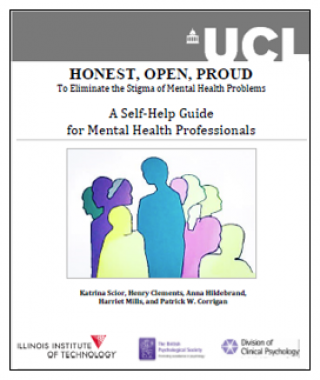Supporting mental health professionals who experience mental health problems in reaching disclosure decisions through a self-help intervention

We have recently completed a pilot study of the HOP-MHP self-help guide. We have therefore stopped recruiting to this study and shall report the findings in due course.
What is HOP-MHP?
HOP-MHP stands for 'Honest, Open, Proud for Mental Health Professionals'. It is a guided self-help intervention for mental health professionals who have lived experience of mental health challenges.
HOP-MHP seeks to support them in reaching decisions around potential disclosure of their lived experience in a way that is personally meaningful, safe and empowering. Ultimately the project seeks to tackle the dichotomy of 'us and them' (providers versus users of mental health services) and to encourage more open conversations about lived experience and stigma among mental health professionals.
The self-help guide consists of three sessions
The first session asks the person to weigh the pros and cons of disclosing, and to examine potentially hurtful self-beliefs using exercises and worksheets; the second session helps them consider different contexts and levels of disclosure – from telling a friend or trusted colleague, to giving a talk in a public setting; the final session focuses on how to tell one’s story in a way that is personally meaningful and safe.
Those who decide not to disclose at this point (either at all or in some contexts) are given space to think about their decision and its implications.
Alongside completing the self-help guide, participants have access to an anonymous web-based peer forum where they can discuss their experiences related to completing the guide and their lived experiences and thoughts around disclosure and being an expert with experience more generally.
The peer forum is a closed forum that is only open to individuals completing the HOP-MHP guide and is designed as a confidential and safe space for peer support and discussion.
HOP-MHP is a pathfinder project for the Collaborative Learning Network, established as the key output of the British Psychological Society and New Savoy Conference Charter on Psychological Wellbeing and Resilience.
Evaluation of the HOP-MHP guide
We have recently completed a pilot study of the HOP-MHP self-help guide. We have therefore stopped recruiting to this study and shall report the findings in due course.
Information about other sources of support
You can find information about external sources of support, links to resources, and information about mental health in the workplace here:
Self-care
As mental health professionals we can often forget the importance of looking after our own needs. Mind helpfully summarise the importance of self-care and the support available for specific mental health problems.
Fitness to Practise
As a mental health professional, you will need to think about whether your experience of mental health problems affects your fitness to practise. For some mental health professions, including practitioner psychologists, fitness to practise is governed by the Health & Care Professions Council (HCPC). The HCPC works on the principle of 'professional self-regulation', by which they mean that you have personal responsibility to maintain and manage your own fitness to practise.
Further details are available on their website and also on this page.
For other professions fitness to practise is governed by different organisations. In any case you may find it useful also to refer to your own profession's guidelines.
- Information on the the British Psychological Society's guidance on safeguarding fitness to practice
Your Legal Rights
It may be important to know your legal rights. For example, you may want to know about your own and your employer’s obligations in relation to your mental health problems. Or you might experience discrimination relating to your mental health and want to know what you can do.
We cannot advise you on your legal rights but we set out details of some organisations who can help and resources that may be useful here:
Whilst we hope you find these helpful, it is important that you take your own independent legal advice in relation to your rights.
If you are a member of a union we recommend you contact them for legal advice.
 Close
Close

